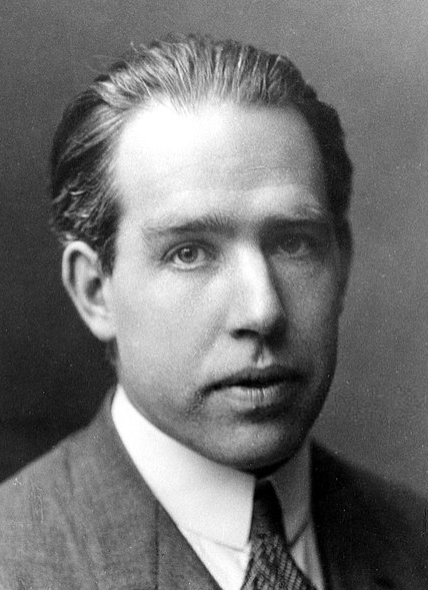
Niels Henrik David Bohr was born on October 7, 1885, in Copenhagen, Denmark, into a well-educated and prominent family. His father, Christian Bohr, was a physiology professor and his mother came from a wealthy Jewish banking family. Niels attended the Gammelholm Grammar School and in 1903, he enrolled in mathematics and physics at the University of Copenhagen where he studied under the university’s only professor of physics, Professor Christian Christiansen–who was probably a Christian. On May 13, 1911, Bohr defended his thesis on the behavior of electrons as gases and graduated with a Ph.D.
In 1913, Bohr proposed his model of the atom, that incorporated the emerging ideas of quantum mechanics and postulated that electrons orbit the nucleus in discrete energy levels or shells. This analogy, that became known as the Bohr model, explained the spectral lines of hydrogen and laid the groundwork for understanding the behavior of electrons within atoms.
Bohr played a key role in the understanding of quantum mechanics, particularly through the Copenhagen interpretation, which he formulated with Werner Heisenberg. This interpretation addressed the probabilistic nature of quantum physics asserting that the mere act of observation or measurement collapsed the particle’s wave function into a particular quantum state. In 1921, he founded the Institute for Theoretical Physics in Copenhagen, that became a hub for theoretical physicists from around the world. It played a crucial role in advancing the field of quantum mechanics.
Niels Bohr was awarded the Nobel Prize in Physics in 1922 for his work on the structure of atoms and the radiation emitted from them. During World War II, he was actively involved in the Manhattan Project, dedicated to the development of the first atomic bomb. He contributed valuable insights on nuclear fission and its potential applications.
After the war, Bohr returned to Denmark and continued his research in nuclear physics. His ideas and contributions to quantum mechanics and atomic theory had a profound and lasting impact on the field of physics, paving the way for the development of quantum physics and the understanding of atomic and subatomic particles.
Niels Bohr passed away, from heart failure, on November 18, 1962, in Copenhagen, Denmark, leaving behind a legacy of groundbreaking contributions to the world of physics. In the decades before Bohr’s passing, the Copenhagen interpretation of quantum physics had troubled Einstein. who could not reconcile himself to the idea that a quantum particle could occupy several different states simultaneously. Einstein frequently insisted, “God does not play dice with the universe,” to which Niels Bohr responded, “Einstein, stop telling God what to do!”
